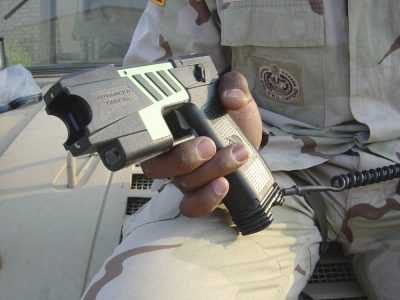
Recent statistics show that Massachusetts police departments nearly doubled their use of electric weapons, such as Tasers and stun guns, from 2015 to 2016.
Police departments owned over 6,000 stun guns in 2016, almost a 50 percent jump from 2015, and nearly doubled the number of guns they owned from just three years earlier, according to a report from the Executive Office of Public Safety and Security.
State Police have accounted for most the majority of this upsurge, according to The Boston Globe, with officers spending approximately $1 million to buy 895 devices in late 2016.
Stephen McNulty, the Boston Police Department spokesperson, wrote in an email to The Daily Free Press that their department only uses electronic control weapons in a limited capacity, stating that only those assigned to their SWAT team are “outfitted” with them.
The BPD has adopted a “less-lethal” force philosophy when it comes to violent situations, according to official BPD rules.
Iván Espinoza-Madrigal, the executive director of the Lawyers’ Committee for Civil Rights and Economic Justice, a law group that fights for equal opportunity for all people, said he’s concerned that there is possible over-reliance on Tasers and other means of force by police.
“We would prefer to see an increase in police officers who are being trained in de-escalation tactic techniques,” Espinoza-Madrigal said. “By minimizing the use of Tasers and relying on time-tested techniques, we would be able to bridge the distance between the police, and particularly, communities of color.”
Espinoza-Madrigal said the report doesn’t describe the way in which police, specifically the Boston Police Department, are particularly utilizing electronic weapons or who they use them on when these situations arise.
“One part of the report I’d like to draw attention to is that the Boston Police Department data is not available, so we have no idea how Tasers are being used by the BPD, and also the data set shows a steady increase over time,” Espinoza-Madrigal said. “It doesn’t come with specifics of racial breakdowns for us to be able to determine whether or not the BPD is targeting people of color in the use of Tasers.”
Mark Link, 56, of North End, said using electronic weapons appears to be a better use of weaponry than other more violent means.
“They have to keep the city safe, and if that means using Tasers and stun guns alike, then I’m okay with that,” Link said. “It’s non-lethal, and a great way to minimize threats.”
On the other hand, Link said the usage of these types of weapons could cause other problems.
“What I don’t want to see is officers using them willy-nilly when someone doesn’t comply right away,” Link said. “Officers are so quick to react, which can be a double-edged sword.”
A new all-time high of 1,084 Tasers used by police were recorded in 2016, according to the report. This comes at around $1,000 to buy each weapon to use in de-escalation situations.
Espinoza-Madrigal said some law enforcement agencies disproportionately use Tasers, raising the concern that these jurisdictions don’t have the proper training for stun gun use and deployment.
“Even though we see cities with large numbers like Springfield have a steady growth in the use of Tasers, you also see it in smaller places, with much less people, raising concern that these small communities are over-relying on Tasers,” Espinoza-Madrigal said.
Adilson Mendes, 30, of Dorchester, said she will remain optimistic regarding the BPD’s intentions.
“I think people are scared of Tasers because of how they’re portrayed and how people look when they’re suffering from the effects of being Tased,” Mendes said. “They convulse and look a little scary, so I think that really gets to people, and might be why they’re opposed to it.”
Sarah Franklin, 24, of Kenmore, said she would rather see people go to the hospital for complications or wounds related to electronic weaponry than from a gunshot.
“I think we can really benefit from using things like that because of the fact that Boston is so progressive and always holding demonstrations and marches,” Franklin said. “The last thing I’d want to see is an unruly protester being dealt with by being shot rather than Tased.”






















































































































